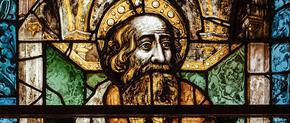The views expressed in our content reflect individual perspectives and do not represent the authoritative views of the Baha'i Faith.
Baha’u’llah’s claim — that he is the prophet and founder of a new spiritual revelation — forms the central message of the Baha’i Faith, which says a fresh spiritual springtime has dawned for humanity.
Once again, Baha’is believe, the world has witnessed the galvanizing advent of a messenger of God who brings a new set of spiritual and social teachings to humanity.
Like Moses or Buddha or Christ, Baha’u’llah’s new Faith raises the call of God and beckons us all to look toward its mystical light.
RELATED: All the Prophets: One and the Same Soul
Yes, that kind of claim has a high bar to clear. However, Baha’u’llah did not demand that every person immediately believe it. Instead, he left it up to the reasoning power of each individual to decide on the merits of its truth and determine whether or not to accept his claim. As Baha’u’llah’s son and successor Abdu’l-Baha said to an American audience in the early part of the 20th century:
… God has created in man the power of reason whereby man is enabled to investigate reality. God has not intended man to blindly imitate his fathers and ancestors. He has endowed him with mind or the faculty of reasoning by the exercise of which he is to investigate and discover the truth; and that which he finds real and true, he must accept. He must not be an imitator or blind follower of any soul. He must not rely implicitly upon the opinion of any man without investigation; nay, each soul must seek intelligently and independently, arriving at a real conclusion and bound only by that reality.
Baha’u’llah did not solicit or encourage blind faith — instead, he asked seekers to make up their own minds after an independent investigation of the truth. So what process can an interested person use to determine the veracity of Baha’u’llah’s claim, since the Baha’i Faith has no clergy?
Baha’u’llah simply invited everyone to look into his teachings, his station, and his claims, and decide for themselves whether or not to accept them. Because of the first principle of the Baha’i Faith, the independent investigation of the truth, Baha’is don’t force their beliefs on others, proselytize the Baha’i teachings, or insist that anyone else accept them. Instead, the call of Baha’u’llah resounds gently, quietly, and peacefully, asking humanity to consider, ponder and meditate on its substantive claims. In his writings, Baha’u’llah couched that challenging call in these terms:
The time foreordained unto the peoples and kindreds of the earth is now come. The promises of God, as recorded in the holy Scriptures, have all been fulfilled. Out of Zion hath gone forth the Law of God, and Jerusalem, and the hills and land thereof, are filled with the glory of His Revelation. Happy is the man that pondereth in his heart that which hath been revealed in the Books of God, the Help in Peril, the Self-Subsisting. Meditate upon this, O ye beloved of God, and let your ears be attentive unto His Word, so that ye may, by His grace and mercy, drink your fill from the crystal waters of constancy, and become as steadfast and immovable as the mountain in His Cause.
So now that you’ve heard about Baha’u’llah’s new revelation, the next question becomes: Is it true? If you find that your answer is yes, it can change your life.

Abdu’l-Baha, the son of Baha’u’llah and the leader of the Baha’i Faith after Baha’u’llah’s passing, gave this advice: “Search for truth. Seek the realities in all religions. Put aside all superstitions.”
RELATED: Comparing Religions, Looking for Truth
Baha’is firmly believe that every person should undertake their own independent search for the truth, and make their decisions based not on tradition or inheritance or culture, but based on what rings true in the mind, heart, and soul, as Abdu’l-Baha described it to an American audience in New York in 1912:
The word of truth no matter which tongue utters it must be sanctioned. Absolute verities no matter in what book they be recorded must be accepted. If we harbor prejudice it will be the cause of deprivation and ignorance. The strife between religions, nations and races arises from misunderstanding. If we investigate the religions to discover the principles underlying their foundations we will find they agree, for the fundamental reality of them is one and not multiple. By this means the religionists of the world will reach their point of unity and reconciliation. They will ascertain the truth that the purpose of religion is the acquisition of praiseworthy virtues, betterment of morals, spiritual development of mankind, the real life and divine bestowals.
Baha’is understand that regardless of where the truth comes from, it is still the truth. But how do you determine what’s true and what’s false? Speaking to a gathering in Paris, Abdu’l-Baha said the first step involves abandoning the prejudices of tradition:
If a man would succeed in his search after truth, he must, in the first place, shut his eyes to all the traditional superstitions of the past.
The Jews have traditional superstitions, the Buddhists and the Zoroastrians are not free from them, neither are the Christians! All religions have gradually become bound by tradition and dogma.
All consider themselves, respectively, the only guardians of the truth, and that every other religion is composed of errors. They themselves are right, all others are wrong! The Jews believe that they are the only possessors of the truth and condemn all other religions. The Christians affirm that their religion is the only true one, that all others are false. Likewise the Buddhists and Muhammadans; all limit themselves. If all condemn one another, where shall we search for truth? All contradicting one another, all cannot be true. If each believe his particular religion to be the only true one, he blinds his eyes to the truth in the others. If, for instance, a Jew is bound by the external practice of the religion of Israel, he does not permit himself to perceive that truth can exist in any other religion; it must be all contained in his own!
We should, therefore, detach ourselves from the external forms and practices of religion. We must realize that these forms and practices, however beautiful, are but garments clothing the warm heart and the living limbs of Divine truth. We must abandon the prejudices of tradition if we would succeed in finding the truth at the core of all religions.
In the next essay in this series, we’ll examine ten central teachings Baha’u’llah gave to the world.

















Comments
Sign in or create an account
Continue with Facebookor